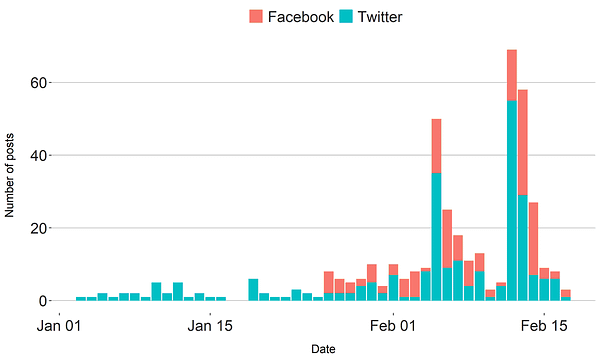The CCP’s coordinated information effort to discredit the BBC | Tencent to call for tighter governance on China's internet economy | Privacy fears as India’s gov’t schools install facial recognition
Follow us on Twitter. The Daily Cyber Digest focuses on the topics we work on, including cyber, critical technologies & strategic issues like foreign interference.
As international media and researchers expose human rights abuses in China, including allegations of systematic sexual assault in Xinjiang’s internment camps, the Chinese Communist Party (CCP) is hitting back with a coordinated information campaign and propaganda targeting the UK public broadcaster, the BBC. CCP diplomatic accounts, Chinese state media, pro-CCP influencers and patriotic trolls on Silicon Valley’s social media networks are spreading messages and narratives that seek to undermine critical reporting by international media, research institutes and NGOs with accusations of bias and disinformation. ASPI ICPC
The founder and CEO of technology giant Tencent Holdings plans to call for tighter governance of the internet economy at China's parliamentary meeting in Beijing, state broadcaster China National Radio (CNR) said on Wednesday. Pony Ma will make the proposal at the National People's Congress (NPC), which starts on Friday, the report said. Hundreds of proposals are likely to be submitted at the annual gathering, though most are suggestions by individual delegates and are not discussed in parliament. Reuters
Facial recognition technologies installed in at least a dozen government-funded schools in Delhi are an “overreach” by the authorities and an invasion of children’s privacy, digital rights advocates say. AlJazeera
ASPI ICPC
Trigger warning. The CCP’s coordinated information effort to discredit the BBC
ASPI ICPC
@JakeWallis_ASPI @AlbertYZhang




China using Big Tech firms to attack BBC in state propaganda campaign, says report
The Telegraph
@sophia_yan
China is using social media platforms such as Twitter to attack the BBC in a state-backed disinformation campaign to undermine critical reporting by Western media on human rights abuses, finds a new report by the Australian Strategic Policy Institute (ASPI).
China's Communist party ran campaign to discredit BBC, thinktank finds
The Guardian
@_EmmaGH
Australian study finds a ‘coordinated effort by CCP’s propaganda apparatus’ to distract from critical BBC reports and redirect narrativeChina’s BBC Attacks Show Growing Sophistication, Group Says
Bloomberg
@jamietarabay
China’s repurposing of domestic internet content to influence Chinese-language audiences around the world, along with using Western voices to resonate internationally, demonstrate its increased understanding in finding new ways to drive influence across cultural and linguistic boundaries, Wallis said.
China
Tencent boss to call for tighter governance on China's internet economy: state media
Reuters
The founder and CEO of technology giant Tencent Holdings plans to call for tighter governance of the internet economy at China's parliamentary meeting in Beijing, state broadcaster China National Radio (CNR) said on Wednesday. Pony Ma will make the proposal at the National People's Congress (NPC), which starts on Friday, the report said. Hundreds of proposals are likely to be submitted at the annual gathering, though most are suggestions by individual delegates and are not discussed in parliament.
How Chinese Companies Push Back On Beijing
Protocol
@dwertime
The Financial Times reported Monday on one major frustration China's regulators have with the not-yet-IPO'd Ant Group: It doesn't share enough data with the government. The People's Bank of China wants to build a database on Ant's 500 million customers, but complains Ant either shares data in insufficient detail or dumps data on PBOC that its staff isn't equipped to handle. Ant reportedly balked at a government request to make data-sharing with the authorities part of its user agreement.
ByteDance developing Clubhouse-like app for China amid copycat rush: sources
Reuters
@yingzhi_yang @teamlipei @brendagoh_
TikTok owner ByteDance is working on a Clubhouse-like app for China, sources familiar with the matter said, as the global success of the U.S.-based audio chat service inspires a rush of copycats in the country.
ByteDance Said to Invest in Chinese Self-Driving Startup QCraft
Bloomberg
Chinese social media titan ByteDance Ltd. is investing in local autonomous driving startup QCraft Inc., according to people familiar with the matter, another sign of the blurring of boundaries between car companies and Big Tech.
TikTok owner ByteDance to pay $92M in US privacy settlement
The Associated Press
@AP
TikTok’s Chinese parent company ByteDance has agreed to pay $92 million in a settlement to U.S. users who are part of a class-action lawsuit alleging that the video-sharing app failed to get their consent to collect data in violation of a strict Illinois privacy law.
China rebukes British ambassador for explaining role of a free press
The Times
@scribblercat @tangdidi
Beijing rebuked Britain’s ambassador to China for posting a defence of the role of the free press on Chinese social media yesterday. Caroline Wilson, who speaks Mandarin and Cantonese in addition to French, Russian and German, posted her article, entitled “Do foreign media hate China?” on WeChat, China’s non-encrypted version of WhatsApp, which banned users from sharing the post.
USA
What can the US learn from our allies on protecting critical infrastructure?
The Hill
@CamilleEsq @ArjunBisen1
As the Senate Intelligence Committee and the White House begin to publicly address the SolarWinds compromise, it is essential to think about how to improve cyber defense and resilience of critical infrastructure as part of a holistic effort to improve our national cybersecurity posture.
Inside ‘TALON,’ the Nationwide Network of AI-Enabled Surveillance Cameras
VICE
@josephfcox
Hundreds of pages of emails obtained by Motherboard show how little-known company Flock has expanded from surveilling individual neighborhoods into a network of smart cameras that spans the United States.


Facebook Helped Fund David Brooks’s Second Job. Nobody Told The Readers Of The New York Times.
BuzzFeed News
@CraigSilverman @RMac18
New York Times columnist David Brooks is drawing a second salary for his work on an Aspen Institute project funded by Facebook and other large donors — a fact he has not disclosed in his columns.
Military Unit That Conducts Drone Strikes Bought Location Data From Ordinary Apps
VICE
@josephfcox
The 132d Wing of the Iowa National Guard bought Locate X, a product that lets users search by a specific area to see which devices were present.
Why are QAnon believers obsessed with 4 March?
BBC
@Shayan86
Their hero is no longer president, but some followers of the fringe QAnon conspiracy theory have latched onto obscure, irrelevant laws in an attempt to keep the faith.
Google’s approach to historically Black schools helps explain why there are few Black engineers in Big Tech
The Washington Post
@nitashatiku
The company tried to recruit engineers by partnering with HBCUs. Critics say the program exposed how the search giant fell short.
North Asia
Reports: Taiwan Semiconductor's Phoenix plant likely three times larger than originally announced
Phoenix Business Journal
@PhxBizCorina
Taiwan Semiconductor Manufacturing Co. Ltd.’s planned Phoenix manufacturing plant will likely be three times larger than was originally announced.
Southeast Asia
Malaysian Armed Forces to set up cyber warfare regiment to strengthen cyber defence, says army chief
Malay Mail
The Malaysian Armed Forces (MAF) has set up a Cyber Warfare Signals Regiment (99 RSPS) in efforts to strengthen its capacity and preparedness in the face of cybersecurity challenges and cyber threats from various domains.
Facebook removes Thai military-linked information influencing accounts
Reuters
Patpicha Tanakasempipat
Facebook has taken down 185 accounts and groups engaged in an information influencing operation in Thailand run by the military, the company said on Wednesday, the first time it has taken down Thai accounts with ties to the government.
South & Central Asia
Privacy fears as India’s gov’t schools install facial recognition
AlJazeera
Facial recognition technologies installed in at least a dozen government-funded schools in Delhi are an “overreach” by the authorities and an invasion of children’s privacy, digital rights advocates say.
UK
‘Dependency’ of UK universities on China creates risks, report says
Financial Times
@bethanstaton
More than a fifth of British university research in many high impact science and technology subjects involves collaboration with China, according to a study that urges the UK to “urgently” improve its monitoring of academic links with an authoritarian regime. The report, led by former universities minister Jo Johnson, is the first comprehensive assessment of Sino-British research collaboration, counting the number of papers co-authored by academics in both countries.
Europe
EU Sets 2030 Target to Produce Cutting-Edge Semiconductors
Bloomberg
@AlbertoNardelli @nat_droz
The European Union is planning to produce its own advanced semiconductors by 2030, part of the bloc’s plans to reduce “high-risk dependencies” on technology companies in the U.S. and Asia.
Misc
Google doubles down on its plan to disrupt ads that target Web history
The Washington Post
@GerritD
Google said Wednesday it will not participate in efforts by other advertising tech companies to build new tools to track people around the Web based on their browser history, a decision that could have implications both for privacy and antitrust.
Marvell to supply chips for Facebook-backed 5G effort
Reuters
Marvell Technology Group Ltd said on Monday its chips will be included in a project from Facebook Inc designed to make it easier and cheaper to deploy 5G networking equipment.
Clubhouse and TikTok Are the Antidote to Twitter's Rage
Bloomberg
@Noahpinion
New social networks are carving off the best pieces of bigger platforms, though they still haven't figured out how to provide reliable news.
Research


Multimodal Neurons in Artificial Neural Networks
Open AI
We’ve discovered neurons in CLIP that respond to the same concept whether presented literally, symbolically, or conceptually. This may explain CLIP’s accuracy in classifying surprising visual renditions of concepts, and is also an important step toward understanding the associations and biases that CLIP and similar models learn.
Events
ASPI Webinar: Are you ready for the new critical infrastructure law?
ASPI ICPC
With amendments to the Critical Infrastructure Act currently before parliament, impacted industry sectors are racing to get ready. ASPI's International Cyber Policy Centre is delighted to invite you to a panel discussion on 18 March at 4pm where representatives from Home Affairs, the cybersecurity sector and industry will discuss the impact of the changes and answer your questions. Register here.



